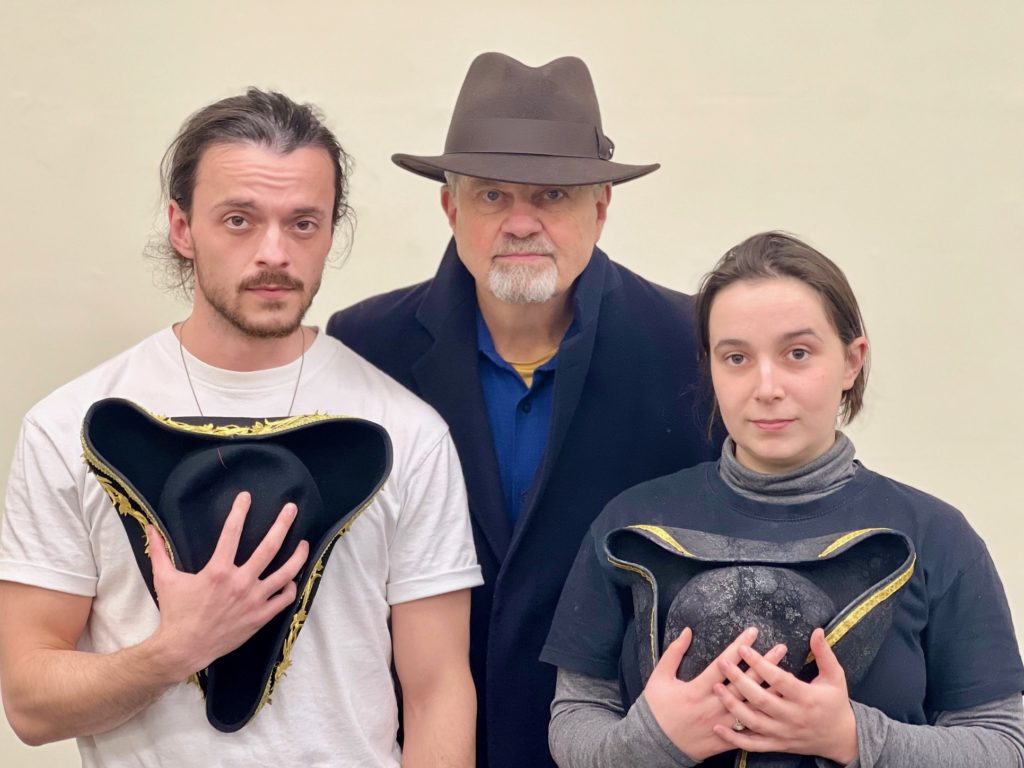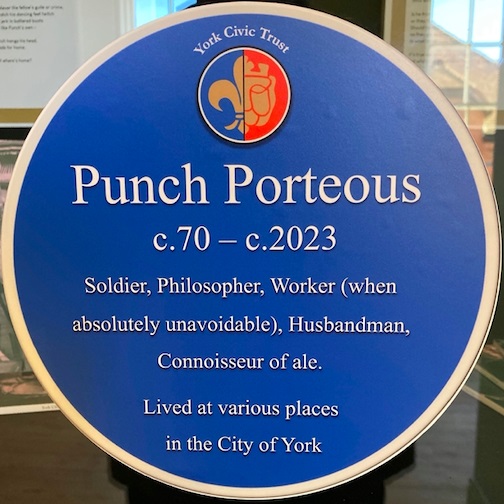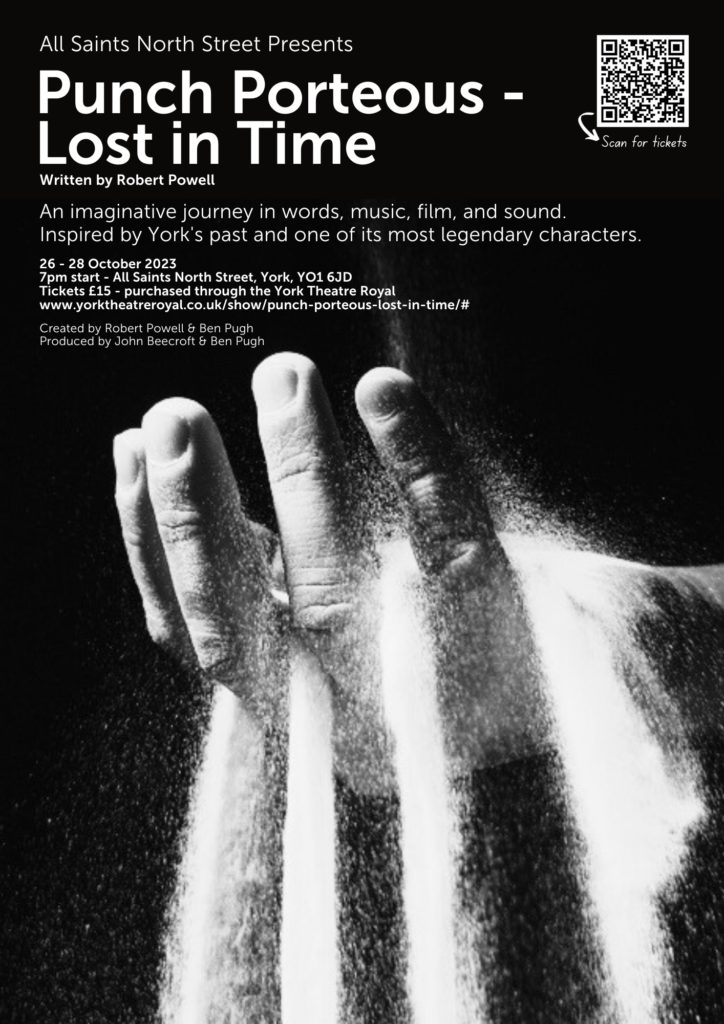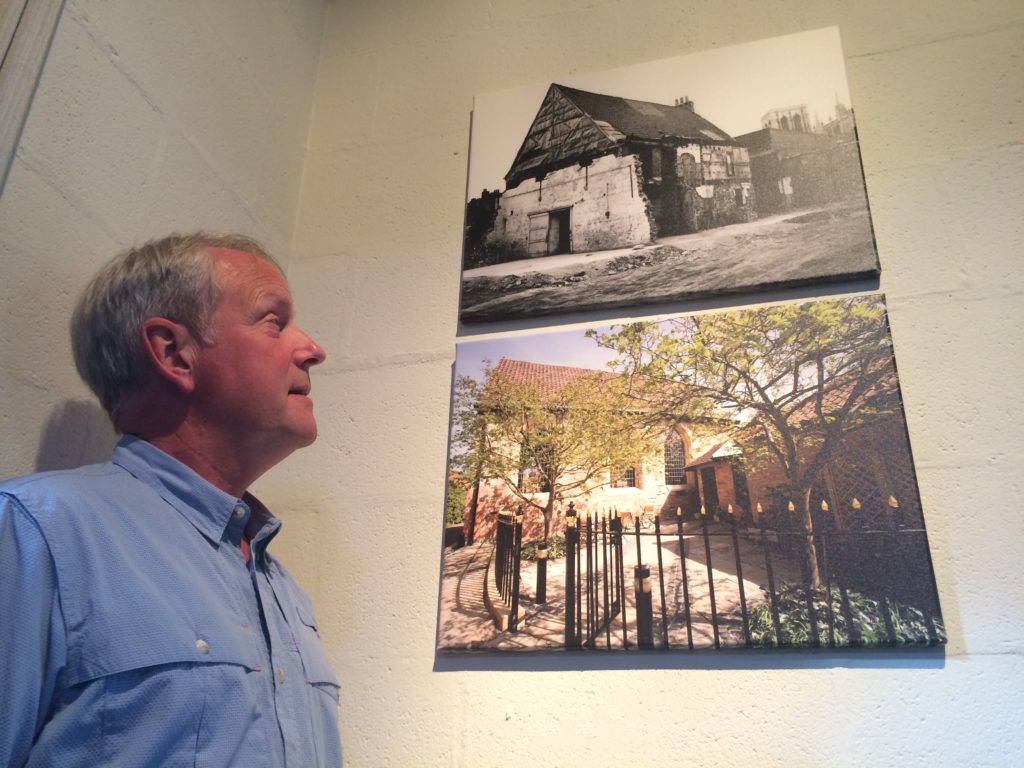
PUNCH Porteous is an ordinary man with an extraordinary predicament, lost in time in York.
While the city shape-shifts around him, he is catapulted unpredictably into different eras of its history from c.70 to c.2023.
Dazed and confused, Punch wakes to find himself among both famous and ordinary people in a “multi-media drama experience” conjured by York poet Robert Powell, creative practitioner Ben Pugh and producer John Beecroft, inspired by the city’s past and one of its most remarkable ancient churches, All Saints North Street.
York Theatre Royal creative director Juliet Forster is supporting the production too, overseeing rehearsals, working with the creative team and actors Nick Naidu and Imogen Wood.
Running at All Saints from tomorrow (26/10/2023) to Saturday at 7pm nightly, the York-made Punch Porteous – Lost In Time Lost uses spoken word, film, sound and performance to draw imaginatively on York’s history to tell the tale of a sometimes comic, sometimes soulful, rogue: York’s very own legendary Punch Porteous, soldier, philosopher, worker (when absolutely unavoidable), husbandman and connoisseur of ale.
When Punch awakes, homeless and yet oddly at home, the city changes around him through Roman, Anglo-Saxon, Medieval, Georgian, Victorian and our own times and back again! Now Punch, suffused with sights and sounds from the past, will make an appearance in the unique setting of All Saints.
The project is the first of its kind at the church and aims to attract new audiences to appreciate this historic place of worship. This week’s performances follow a three-year restoration of All Saints North Street’s medieval painted and stained glass, funded by the National Lottery Heritage Fund, which attendees can view during the interval.
Robert Powell, York Civic Trust’s writer-in-residence, says: “It’s very exciting to be in the final run-up to the production, and to be working with All Saints and such a dynamic team of artists. The church has been a real inspiration to us, as I’m sure it will be to audiences.
“They will be able to hear about Punch’s eccentric adventures and the rich history of York – its rivers, streets, strays, and stories – in one of its most extraordinary sites. And of course we’re expecting the evasive Punch to turn up during each performance.”
Bishop Glyn Webster, priest-in-charge at All Saints North Street, says: “The church has a long history of commissioning works of art and – thanks to money raised by National Lottery players – we are delighted to be able to continue this tradition by commissioning a performance that celebrates our wonderful church, the city of York, and the people who have lived and worshipped here through the centuries.”

Writer Robert Powell discusses the York legend of ever evasive Punch Porteous with CharlesHutchPress
What is the story behind Punch Porteous?
“A few years back, a friend who was raised in York told me a story about someone called Punch Porteous – a story he’d heard from his father – who’d won some money at York Races, had a tin hip-bath with beer at the Red Lion pub, and then offered it for free to passers-by at the tram stop on Market Street.
“I wrote a poem about that, but this character haunted me. I thought that if someone like that was floating in time like a sort of legend, it would be a great way of exploring York’s past in an unusual way. I began to write a series of poems, and the play has come from those.
“By the way, Charles, have you met this guy?” [Answer: No! Not knowingly. Still awaiting that knock-out Punch encounter.]
How did the multi-media structure of spoken word, film, sound, and performance come to fruition?
“It’s a way of combining skills and disciplines to create something that plays quite joyfully with different genres. Something a bit different for audiences too, something surprising. They say that the past is a different country, so to evoke it creatively, you need different tools! Working with Ben and John Beecroft has enabled this cross-disciplinary approach of sound and words and film.”
Have you worked with Ben Pugh previously?
“Yes. Ben and I made a film called The River Speaks in 2017, based around my poems about the rivers Ouse and Foss. Then, with Kitty Greenbrown, we made two short film-performances for York Theatre Royal as part of their post-Covid Love Bites and Green Shoots programmes. Ben is a terrific producer, but also a talented creative in his own right.”
How have you found the experience of working with actors Nick Naidu and Imogen Wood?
“For me, this was a great new adventure and pleasure. I’ve always liked to hear other voices read my poems, but in this case Nick and Imogen have created fully developed characters and brought the words and stories wonderfully to life. Through them, my characters surprised me, as if I was meeting them for the first time. The written page walks and talks – and also sings, as you’ll see!”

How did Theatre Royal creative director Juliet Forster become involved?
“Juliet’s involvement has been an unexpected gift and asset for us. She is always hugely interested in York stories. She liked the work we’d done with the Theatre Royal previously and seems to really empathise with the poems and the story – or maybe just fallen in love with the elusive Punch Porteous! We could hardly have done the production without her experience and skills, and access to the Theatre Royal facilities.”
What led to All Saints North Street being the venue for Punch Porteous – Lost In Time?
“Ever since seeing the medieval windows at All Saints a few years ago, I felt an affinity with this church with its squint and spire and proximity to the river. In particular, the ‘Pricke of Conscience’ window, illustrating the last 15 days of Creation and containing lines from a 14th century poem, seemed to call to me as a writer.
“I was sure it could be the seed for a story about York’s deep past, and the threats of our times – Covid, climate change – and about the lives and loves and fears of ordinary people through the ages. I wondered what woud happen if Punch Porteous walked into the church – over the centuries and again now. So when the church offered this commission, we leapt at it.”
Punch Porteous – Lost In Time runs at All Saints North Street, York, October 26 to 28, 7pm. Tickets: yorktheatreroyal.co.uk/show/punch-porteous-lost-in-time/
ALL Saints North Street, York, is open daily for visitors from 10am to 4pm, with a Thursday lunchtime service at 12.30pm and Sung Mass at 5.30pm on Sunday evenings.
Did you know?
A SQUINT, also known as a leper-hole or hagioscope, is a viewing device in a medieval church. It takes the form of a small opening, cut through a chancel arch or wall, to enable worshippers in an aisle or side chapel to see and follow the ceremonies at the altar.



